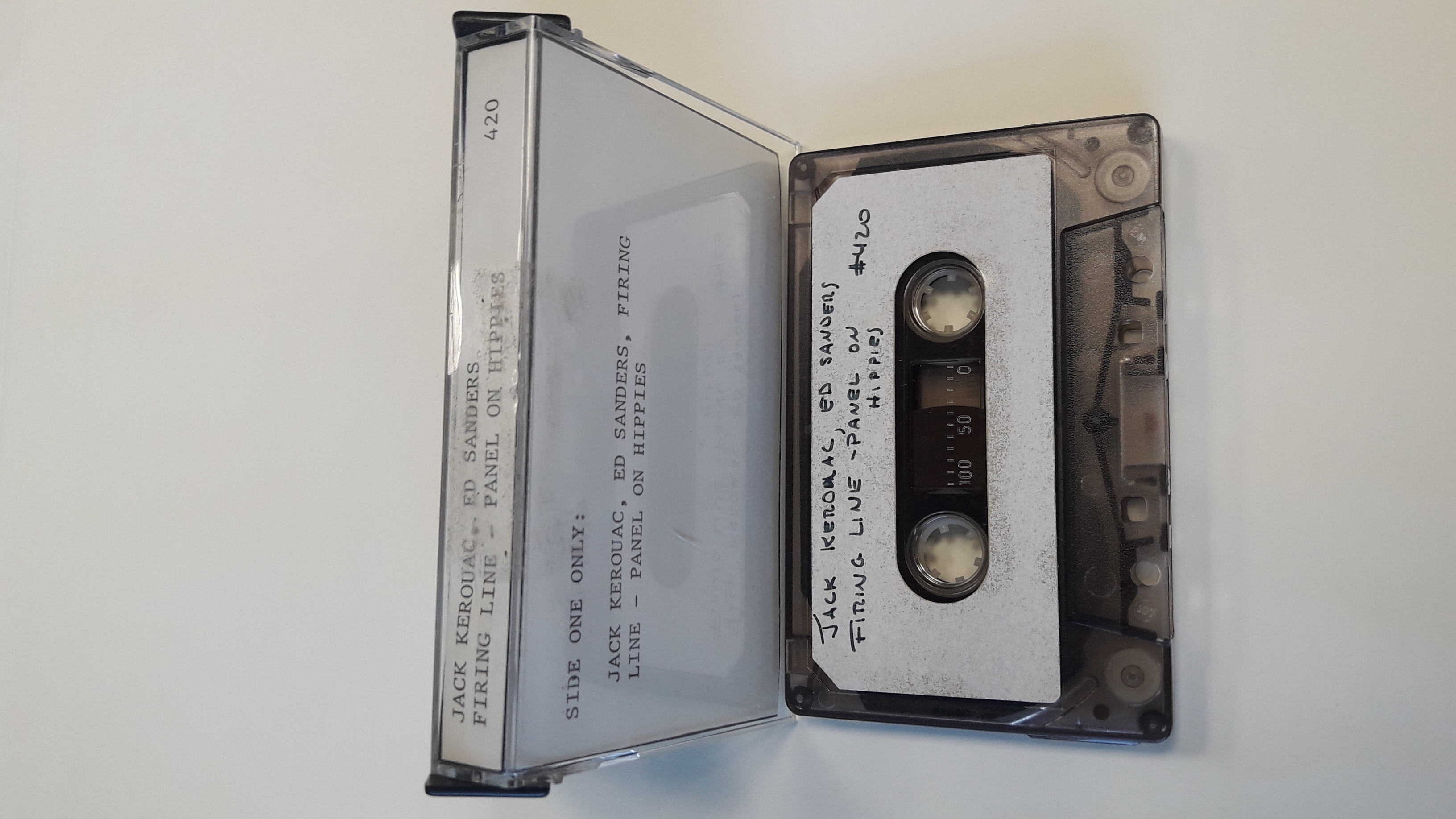CLASSIFICATION
Swallow ID:
5670
Partner Institution:
Simon Fraser University
Source Collection Title:
Reading in BC Collection
Source Collection ID:
MsC 199
Source Collection Description:
Reading in BC collection was assembled during the late 1970s and ‘80s. There are approximately 1000 tapes in this collection. It consists of the recordings of Canadian and American writers, mostly poets, reading poems, talking, being interviewed, participating in panel discussions, and so on. Most of the recordings were made in BC, but there are some made elsewhere in Canada or the USA. Quite a few of these recordings are unique copies, not to be found elsewhere.
Source Collection Contributing Unit:
SFU Library
ITEM DESCRIPTION
Title:
Firing Line program - Panel on Hippies: Jack Kerouac and Ed Sanders, 1968 #420
Title Source:
J-card and inventory
Language:
English
Production Context:
Documentary recording
Rights
Rights:
Copyright Not Evaluated (CNE)
CREATORS
Name:
Kerouac, Jack
Dates:
1922-1969
Role:
Speaker
Name:
Sanders, Ed
Dates:
1939-
Role:
Speaker
MATERIAL DESCRIPTION
Image:

Recording Type:
Analogue
AV Type:
Audio
Material Designation:
Cassette
Physical Composition:
Magnetic Tape
Track Configuration:
2 track
Playback Mode:
Stereo
Sound Quality:
Good
Physical Condition:
Good
Other Physical Description:
Black and white clear jewel case with J card
DIGITAL FILE DESCRIPTION
Channel Field:
Stereo
Sample Rate:
44.1 kHz
Duration:
T00:45:15
Size:
43.7 MB
Bitrate:
32 bit
Encoding:
WAV for master files and .MP3 for online files
Channel Field:
Stereo
Sample Rate:
44.1 kHz
Duration:
T00:49:40
Size:
52.4 MB
Bitrate:
32 bit
Encoding:
WAV for master files and .MP3 for online files
Notes:
It's blank
Dates
Date:
1968
Type:
Production Date
Source:
Inventory
CONTENT
Contents:
Side Track No. Comments
One 000
006 A panel involving Jack Kerouac, Ed Sanders and others are interviewed about the Hippy movement
025 Interviewer asks Saunders if he is a “hippy”; and if not, how does he differ
047 Question – “Are we to assume from this that the [Hippy] does not have a highly developed political ideology?”
065 The interviewer searches for a general definition of “Hippy”
100 “What distinguishes the Hippy movement?”
117 Kerouac is asked, “To what extent do you believe that the Beat generation is related to the Hippies…?”
130 Kerouac responds about the aspects of social insurrection which have been associated with the Beat generation
185 An unidentified speaker ties the concept of misanthropy to the war: suggesting that a street culture has evolved as a way of rejecting the prospects of entering the Vietnam war
210 A university professor searches for a comprehensive definition to the Hippy movement
250 American politics – particularly the governments of Kennedy and Johnson are compared
284 Kerouac is asked if he thinks Americans are disillusioned with the political process
300 Sanders makes extensive comments about Czechoslovakia, and legitimate means of non-violent political protest
340 The discussion focuses upon recent issues involving violent confrontations between police and demonstrators
409 Kerouac – “There are people who make a rule of creating chaos, once that chaos is under way, then they can be elected as the people to take care of the chaos… these people become ‘commissars’ of violence.”
485 The “psychedelic creed” of the hippy movement is examined. A question is directed to a panel member:
547 “What kind of a future do you see for the Hippy movement?”
564 “Would any of you regard the Hippy movement … as a manifestation of the psychological inadequacies of the individual Hippies themselves?”
591 “Do [the Hippies] plan to make it a life-time occupation; are they just going to sit around and watch the world go by?”
599 End. End Side One
Notes:
SFU BC Readings formatting
NOTES
Note:
Firing Line program: panel on Hippies

